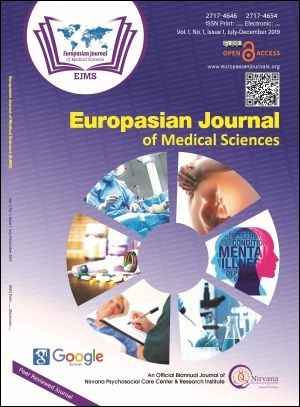Efficacy of Mefenamic acid and Ginger on Pain Relief in Primary Dysmenorrhea Among Basic Sciences Students of Nepalgunj Medical College
Keywords:
Primary Dysmenorrhea, Meftal, Remezy, Multi-diensional Scoring System (MSS), Nepalgunj Medical College (NGMC)Abstract
Background: Primary dysmenorrhea have been reported as the most common cause of regular absenteeism among young women. Pain affects daily activities and quality of life. The aim of the study was to compare the efficacy between mefenamic acid (Meftal) and ginger capsules (Remezy) among Basic Sciences Students of Nepalgunj Medical College (NGMC), Chisapani. Adverse effects, if any, were also observed in both Meftal and ginger group.
Method: This was a prospective cross-sectional study conducted from July 2018 to February 2019. Out of 104 students, 87 were suffering menstrual pain. These 87 individuals received Mefenamic acid (Meftal) 500mg twice a day for three days and the same 87 individuals, in their next month of period, took ginger capsules (Remezy) 500mg twice daily for three days. Medication was started on the first day of their menstruation. The severity of pain before and after the medication was recorded with the help of a multi-dimensional scoring system (MSS). All the data were directly entered into SPSS 20.0 and compiled, analyzed and expressed in tables and charts.
Results: Out of 104, 87 (83.7%) students had experienced menstrual pain. The mean±S.D age of the students was 19.64±1.02 while the mean±S.D menarche age was 13.21±1.01. The pain severity of dysmenorrhea was significantly reduced (p<0.05) with both meftal and ginger intake in both the first and second months consecutively. However, a comparison of efficacy between the two medications showed no statistically significant difference (p>0.05). Adverse effects were found to be significantly higher in students receiving meftal tablets.
Conclusion: A high proportion of students had dysmenorrhea. Similar efficacy of ginger and meftal was observed with minimal adverse effects in ginger. Findings suggest the need for educating students on appropriate and effective management of dysmenorrhea.
Downloads
Downloads
Published
How to Cite
Issue
Section
License
The author(s) retain the ownership of the copyrights for their work published in EJMS without any restrictions. Upon submission, the author(s) grants EJMS a license to publish, including to display, store, copy, and reuse the published content.
License to Publish
By submitting a manuscript to EJMS, the author(s) grant the journal a non-exclusive license to:
- Publish and distribute the content in all formats, media, and platforms (both existing and future), while identifying EJMS as the original publisher.
- Reproduce, display, and store the content in both print and online formats, including institutional and digital repositories.
- Translate, adapt, and summarize the work, including reprints, extracts, and abstracts.
- Develop derivative works based on the original content.
- Include the work in electronic databases and provide links to third-party materials.
Creative Commons Licensing
In addition to EJMS’s publishing rights, authors grant third parties the right to use, share, and distribute their work under the Creative Commons Attribution 4.0 (CC BY 4.0) International License. This allows unrestricted use of the content, provided proper attribution is given to the original author(s) and the journal.

